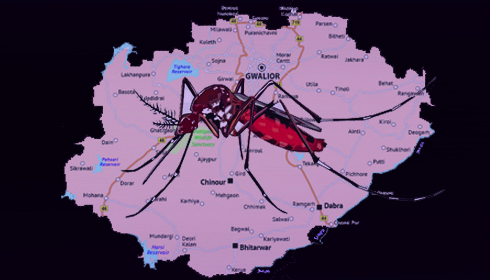
Over 100 dengue cases have been reported in Gwalior: Officials
More than 100 dengue cases have been reported in the Gwalior district of Madhya Pradesh, with 37 diagnosed in September alone, the district health officials said.
According to a media report, approximately nine cases were reported in Madhav Nagar, Vijay Nagar, and Harishankar Puram; six cases in the Baradari area; six cases in Tyagi Nagar; nine cases in Thatipur; 21 cases in the Lashkar area; 28 cases in the Morar sector; and 30 cases were reported in Bhitarwar and Dabra.
The doctors at the District Government Hospital in Morar are struggling to provide adequate treatment to the rising number of patients due to poor infrastructure and are unable to isolate them.
There is a separate dengue ward in the hospital, but general patients are admitted there as well! Patients are forced to occupy the benches in the gallery meant for visitors. Compounding the problem is the issue of water stagnation due to ongoing construction activities in many places in the hospital. Even waterlogging could be seen near the hospital gate, where mosquito larvae were seen thriving.
Read More:
| - Delhi hospital witnessing spike in Viral fever, typhoid, dengue, and COVID-19 |
Dengue is a mosquito-borne viral disease caused by the dengue virus (DENV), which is transmitted to humans by the bite of infected Aedes aegypti or Aedes albopictus mosquitoes. Fever, severe headache, body aches, nausea, vomiting, weakness, and rash are some of the most prevalent symptoms of this condition.
During a media interaction, Dr Manish Sharma, chief medical and health officer of Gwalior, said, "27 cases of dengue have been confirmed, out of which 16 patients are from Gwalior. We are taking all measures to contain the spread of the disease. In coordination with the municipal corporation, we are doing contact tracing and door-to-door surveys."
"The hotspot zones with the greatest dengue cases are being closely monitored. Our staff is monitoring the situation and conducting larval surveys. Sanitation staff are performing sanitisation and fogging," Dr Sharma noted.
He further urged citizens to maintain good hygiene in and around their community, to follow instructions to stop the virus from spreading and to seek medical attention if they experience any symptoms.
Additional commissioner of the Municipal Department, Gwalior, Vijay Raj, said, "In some areas, waterlogging has occurred due to rain. Removal of waterlogging is underway in collaboration with the malaria department."
Highlighting the commitment of the state government, Dr Vinod Doneria, District Malaria Officer, said, "As soon as there is any information about waterlogging in the area, we will administer temephos (a larvicide) along with guppy fish in the areas of Gwalior, Lashkar, and Thatipur, where there is a source of water. Our team is also visiting the locations where patients are found."
Experts suggest avoiding travel to malaria-infected areas, wearing clothes that cover the whole body, using mosquito repellants, maintaining appropriate hygiene, and consulting a healthcare professional immediately if symptoms are present.